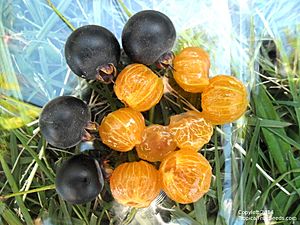Guabiyu facts for kids
Quick facts for kids Guabiyu |
|
|---|---|
 |
|
| Conservation status | |
| Scientific classification |
|
| Kingdom: | Plantae |
| Clade: | Tracheophytes |
| Clade: | Angiosperms |
| Clade: | Eudicots |
| Clade: | Rosids |
| Order: | Myrtales |
| Family: | Myrtaceae |
| Genus: | Myrcianthes |
| Species: |
M. pungens
|
| Binomial name | |
| Myrcianthes pungens (Berg) Legr.
|
|
| Script error: The function "autoWithCaption" does not exist. | |
Script error: No such module "Check for conflicting parameters".
The guabiyu (scientific name: Myrcianthes pungens) is a type of plant that belongs to the Myrtaceae family. This family includes many well-known plants like eucalyptus and myrtle. The guabiyu tree grows naturally in parts of Brazil and Uruguay.
Contents
What Does Guabiyu Look Like?
The guabiyu is a medium-sized tree. It can grow up to 10 meters (about 33 feet) tall. Its branches are a bit fuzzy and spread out.
Leaves, Bark, and Flowers
The leaves of the guabiyu tree are stiff and shaped like an oval. They are about 4 to 7 centimeters long. The top side of the leaves is a bright green, and the underside is a lighter green.
The tree's bark is rough and light brown. It often has pieces that peel off easily. If you look inside the bark, it's whitish. When you cut the bark, it gives off a soft, pleasant smell. The flowers are tiny and white. They are also very fragrant and grow in large numbers.
Fruits and When They Grow
The guabiyu tree produces small, round fruits. Each fruit is about 1 centimeter (less than half an inch) wide. When they are ripe, they turn a dark purple color. The fruit's inside is sweet and can be eaten. Each fruit usually has one large seed.
The guabiyu tree blooms, meaning its flowers appear, from September to October. Its fruits are ready to be picked from November to January. You can find these trees in certain areas of Paraguay, like the departments of Guaira, Caaguazú, and Cordillera.
Where Guabiyu Grows and How It's Used
The guabiyu tree is often planted in parks and gardens. People like it because it's pretty and can be used to make colorful fences. It can grow as a tree or a shrub.
Special Uses
The leaves of the guabiyu tree have a special use. If you crush them and scatter them on the ground, they release a sticky substance called resin. This resin helps to keep flies away.
See also
- Myrcianthes coquimbensis
- Myrcianthes rhopaloides
 | Frances Mary Albrier |
 | Whitney Young |
 | Muhammad Ali |


